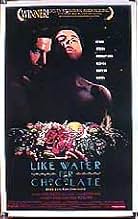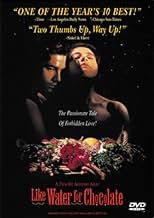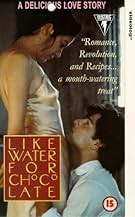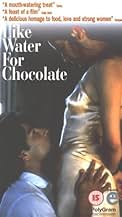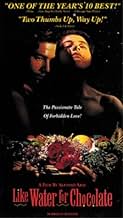IMDb रेटिंग
7.1/10
20 हज़ार
आपकी रेटिंग
अपनी भाषा में प्लॉट जोड़ेंWhen tradition prevents her from marrying the man she loves, a young woman discovers she has a unique talent for cooking.When tradition prevents her from marrying the man she loves, a young woman discovers she has a unique talent for cooking.When tradition prevents her from marrying the man she loves, a young woman discovers she has a unique talent for cooking.
- 1 BAFTA अवार्ड के लिए नामांकित
- 27 जीत और कुल 14 नामांकन
फ़ीचर्ड समीक्षाएं
The two things that stood out for me in this film are the telling of this story and how you had no idea what was going to happen next and of course the performance of Lumi Cavazos. Its one of those rare experiences that stay with you long after you have seen the film. Both strong and self assured. Whats really amazing is that its Cavazos first film role (That I know of, anyway) her natural charm is essential to this story. Not a film for all taste's but a very unique movie overflowing with romantic grandeur.
Usually when I read a book, I am disappointed by the movie; there is so much more in the written word than can be put on screen. And when I see a movie I never want to read the book afterwards. This was the first movie that I read the book after seeing the movie; Como Agua Para Chocolate is THAT good a movie! And the book is WONDERFUL! The fairy tale aspect of this movie is told subtly, but with a strong Hispanic sense of mysticism-- you have the evil (step)mother, the heroine as Virgin Mary, who has magical powers, unrequited love, the unobtainable prince, and other classic fairy tale elements. This combines with the real elements of the Mexican Revolution and old world family practices revolving around family relations, martimony, and most of all cooking. Food plays a major role in this movie, but even more so in the book. I recommend both the book and the movie.
Like Water for Chocolate is a masterpiece in that it conveys the essence of our ancestors' knowledge forgotten in the fast pace of modern living.
It centers around the wonder of cooking: a sacred ritual, not a boring chore; and when done right, with love, it creates magic. Raised and taught to cook by her old Mayan nanny, Tita (exquisitely performed by Lumi Cavazos) masters the near-magical ability of transferring her love and other feelings into her creations passed into one who eats them.
The characters senses are so refined, they enable everyone involved in this family drama to be tuned to the finest nuances of their world, opening the door to non-material pleasures. Rich with metaphors, their language reflects the skills of keen and sometimes humorous observation. The story brings our perception to a different level - as its characters' empathy borders on miracles and magic, and things we only sense and feel become real. Tita's virgin breasts, feeling `like dough kneaded' by strong hands, turn into mature breasts under Pedro's burning eyes (to later start lactating) - their glances, just like her food, becoming the means of communicating their forbidden love.
Yet all magic becomes wasted in the face of a man's choice. The Universe may scream into Pedro's ears about the path he is to take, but if he doesn't follow it, no magic can save him. We witness the story of a fatal attraction between two soulmates, whose passion, confined by an enslaving family tradition, lights up everyone around them... But for themselves, it's so intense, it literally engulfs the lovers in flames. Did they have an alternative? It is for the viewer to figure out.
You may ponder, however, over the young doctor's Indian grandmother saying that `each of us is born with a box of matches inside but we can't strike them all by ourselves; we need oxygen and a candle to help. The oxygen would come from a lover's breath; the candle could be a food, a melody, a word, a caress, or a sound...' He remembers her warning, though, that `it is important to light the matches one at a time' because otherwise the heat generated would produce too dazzling a brilliance.
Thus the wisdom of the ages, just like the power, is passed here through women and the men who are in tune with them. And the intense interactions between the colorful characters of five generations extend to dead family members who continue to counsel or despise the living.
When coming into her room with Pedro after 22 years of their waiting for each other, Tita is greeted by her long deceased nanny lighting her bed and the room with multiple candles. And the consequences of one's actions carries on beyond time - as each person continues her path notwithstanding death.
Hot yellow-red colors intermixed with dense lighting rekindle one's passion for living and appreciation for the gifts and mysteries of the Mexican land. The magic realism becomes a way of living in a culture connected with its heritage.
I recommend Like Water for Chocolate to anyone who feels like he/she is lacking color and passion in life - if watched with an open mind and heart, this beautiful and enigmatic film will stir your senses and imagination and light up your box of matches!
It centers around the wonder of cooking: a sacred ritual, not a boring chore; and when done right, with love, it creates magic. Raised and taught to cook by her old Mayan nanny, Tita (exquisitely performed by Lumi Cavazos) masters the near-magical ability of transferring her love and other feelings into her creations passed into one who eats them.
The characters senses are so refined, they enable everyone involved in this family drama to be tuned to the finest nuances of their world, opening the door to non-material pleasures. Rich with metaphors, their language reflects the skills of keen and sometimes humorous observation. The story brings our perception to a different level - as its characters' empathy borders on miracles and magic, and things we only sense and feel become real. Tita's virgin breasts, feeling `like dough kneaded' by strong hands, turn into mature breasts under Pedro's burning eyes (to later start lactating) - their glances, just like her food, becoming the means of communicating their forbidden love.
Yet all magic becomes wasted in the face of a man's choice. The Universe may scream into Pedro's ears about the path he is to take, but if he doesn't follow it, no magic can save him. We witness the story of a fatal attraction between two soulmates, whose passion, confined by an enslaving family tradition, lights up everyone around them... But for themselves, it's so intense, it literally engulfs the lovers in flames. Did they have an alternative? It is for the viewer to figure out.
You may ponder, however, over the young doctor's Indian grandmother saying that `each of us is born with a box of matches inside but we can't strike them all by ourselves; we need oxygen and a candle to help. The oxygen would come from a lover's breath; the candle could be a food, a melody, a word, a caress, or a sound...' He remembers her warning, though, that `it is important to light the matches one at a time' because otherwise the heat generated would produce too dazzling a brilliance.
Thus the wisdom of the ages, just like the power, is passed here through women and the men who are in tune with them. And the intense interactions between the colorful characters of five generations extend to dead family members who continue to counsel or despise the living.
When coming into her room with Pedro after 22 years of their waiting for each other, Tita is greeted by her long deceased nanny lighting her bed and the room with multiple candles. And the consequences of one's actions carries on beyond time - as each person continues her path notwithstanding death.
Hot yellow-red colors intermixed with dense lighting rekindle one's passion for living and appreciation for the gifts and mysteries of the Mexican land. The magic realism becomes a way of living in a culture connected with its heritage.
I recommend Like Water for Chocolate to anyone who feels like he/she is lacking color and passion in life - if watched with an open mind and heart, this beautiful and enigmatic film will stir your senses and imagination and light up your box of matches!
Tita (Lumi Cavazos) was born in the kitchen in 1895 Rio Grande, Mexico. After the death of her father, her mother vows to force her youngest Tita to care for her entire life. Tita grows up in the kitchen with servant Nacha. She falls in love with Pedro Muzquiz but her mother refuses to permit her to marry. Her mother offers older sister Rosaura and Pedro accepts hoping to stay close to Tita. Tita's tears infuse the wedding cake with her sadness.
This has a great magically realism. It's a fable of food, family, and passion. The story is fun and fanciful. Lumi Cavazos is a sweet endearing lead. The only drawback is the limited chemistry in the epic romance. It's probably asking too much. They don't have much time together before they have to be Romeo and Juliet. Then they have to be apart. It's submerged passion and Pedro doesn't always come across well.
This has a great magically realism. It's a fable of food, family, and passion. The story is fun and fanciful. Lumi Cavazos is a sweet endearing lead. The only drawback is the limited chemistry in the epic romance. It's probably asking too much. They don't have much time together before they have to be Romeo and Juliet. Then they have to be apart. It's submerged passion and Pedro doesn't always come across well.
10FrankL
This is a wonderful, fanciful and very erotic movie. It is a rare film that is as good as the book on which it is based. It was a wise decision to have Laura Esquivel, the author of the book, write the screenplay. The story contains so much fantasy, I thought it might be very difficult to translate it sucessfully to the screen, but the results are superb.
The scene in which Tita's sister is so aroused after eating Tita's Rose Petal soup that she literally burns down their outdoor shower from her body heat and then runs naked across the plain only to be scooped up and carried away on horseback by a bandit is one of the sexiest moments ever put on film.
This movie is not for everyone, but if you enjoy erotic (but NOT pornographic) fantasy, try "Like Water for Chocolate"!
The scene in which Tita's sister is so aroused after eating Tita's Rose Petal soup that she literally burns down their outdoor shower from her body heat and then runs naked across the plain only to be scooped up and carried away on horseback by a bandit is one of the sexiest moments ever put on film.
This movie is not for everyone, but if you enjoy erotic (but NOT pornographic) fantasy, try "Like Water for Chocolate"!
क्या आपको पता है
- ट्रिवियाThe original literal title means very little outside Mexico (it refers to the exact boiling temperature water needs to reach in order to make hot chocolate). Therefore, in France the title has been changed into "Bitter Chocolate", in Poland into "Quails in Rose Petals" and in Japan into "The Legend of the Rose Petal Sauce".
- गूफ़When Dr. Brown holds up a piece of white phosphorus, nothing happens. White phosphorus ignites in air at room temperature, however, so it should have been shown burning.
- इसके अलावा अन्य वर्जनThe International version is color-corrected, and some voices were re-dubbed in the English spoken language scenes. Includes sex & nudity scenes.
- कनेक्शनFeatured in The 50th Annual Golden Globe Awards (1993)
- साउंडट्रैकMi Querida Capitan
Written by José Alfonso Palacios
टॉप पसंद
रेटिंग देने के लिए साइन-इन करें और वैयक्तिकृत सुझावों के लिए वॉचलिस्ट करें
- How long is Like Water for Chocolate?Alexa द्वारा संचालित
विवरण
- रिलीज़ की तारीख़
- कंट्री ऑफ़ ओरिजिन
- आधिकारिक साइटें
- भाषाएं
- इस रूप में भी जाना जाता है
- Like Water for Chocolate
- फ़िल्माने की जगहें
- उत्पादन कंपनियां
- IMDbPro पर और कंपनी क्रेडिट देखें
बॉक्स ऑफ़िस
- बजट
- $20,00,000(अनुमानित)
- US और कनाडा में सकल
- $2,16,65,468
- US और कनाडा में पहले सप्ताह में कुल कमाई
- $23,600
- 21 फ़र॰ 1993
- दुनिया भर में सकल
- $2,17,44,201
- चलने की अवधि1 घंटा 45 मिनट
- रंग
- ध्वनि मिश्रण
- पक्ष अनुपात
- 1.85 : 1
इस पेज में योगदान दें
किसी बदलाव का सुझाव दें या अनुपलब्ध कॉन्टेंट जोड़ें



